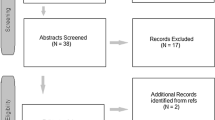Abstract
Purpose
Galectin-3 expression is modulated in cancer cells, and that finding has led to the recognition of galectin-3 as a diagnostic or prognostic marker for various cancers, including breast cancer. This study investigated the correlation between galectin-3 expression and the clinicopathological features in patients with breast cancer, in order to determine the relevance and role of galectin-3 in breast cancer progression.
Methods
Galectin-3 expression was investigated immunohistochemically in 116 patients with breast cancer, and a statistical analysis was performed.
Results
Galectin-3 expression in breast cancer was significantly associated with tumor vascular invasion. However, galectin-3 expression was not associated with Ki-67 expression, which reflects tumor proliferation. Disease-free survival and long-term overall survival were significantly shorter for patients with reduced galectin-3 expression.
Conclusions
This study demonstrated that the galectin-3 expression was associated with tumor vascular invasion and metastasis, suggesting that galectin-3 plays a critical role in tumor progression via an invasive mechanism but not via proliferation in breast cancer. Furthermore, reduced expression of galectin-3 is useful for predicting a long-term poor prognosis in patients with breast cancer.


Similar content being viewed by others
References
Barondes SH, Castronovo V, Cooper DN, Cummings RD, Drickamer K, Keizi T, Gitt MA, Hirabayashi J, Hughes C, Kasai K, Leffler H, Liu F, Lotan R, Mercurio AM, Monsigny M, Pillai S, Poirer F, Raz A, Rigby PW, Rini JM, Wang JL. Galectins: a family of animal beta-galactoside-binding lectins. Cell. 1994;76:597–8.
Liu FT, Rabinovich GA. Galectins as modulators of tumour progression. Nat Rev Cancer. 2005;5:29–41.
Krzeslak A, Lipinska A. Galectin-3 as a multifunctional protein. Cell Mol Biol Lett. 2004;9:305–28.
Takenaka Y, Fukumori T, Raz A. Galectin-3 and metastasis. Glycoconj J. 2004;19:543–9.
Inohara H, Raz A. Functional evidence that cell adhesion. Cancer Res. 1995;55:3267–71.
Ray S, Lukyanov P, Ocheing J. Extracellular functions of galectin-3. Glycoconj J. 2004;19:527–35.
Newlaczyl AU, Yu LG. Galectin-3—a jack-of-all-trades in cancer. Cancer Lett. 2011;313:123–8.
Castronovo V, Van Den Brule FA, Jackers P, Clausse N, Liu FT, Gillet C, Sobel ME. Decreased expression of galectin-3 is associated with progression of human breast cancer. J Pathol. 1996;179:43–8.
Idikio H. Galectin-3 expression in human breast carcinoma: correlation with cancer histologic grade. Int J Oncol. 1998;12:1287–90.
Shekhar MP, Nangia-Makker P, Tait L, Miller F, Raz A. Alterations in galectin-3 expression and distribution correlate with breast cancer progression: functional analysis of galectin-3 in breast epithelial–endothelial interactions. Am J Pathol. 2004;165:1931–41.
Honjo Y, Nangia-Makker P, Inohara H, Raz A. Down-regulation of galectin-3 suppresses tumorigenecity of human breast carcinoma cells. Clin Cancer Res. 2001;7:661–8.
van den Brule FA, Berchuck A, Bast RC, Liu FT, Gillet C, Sobel ME, Castronovo V. Differential expression of the 67-kD laminin receptor and 31-kD human laminin-binding protein in human ovarian carcinomas. Eur J Cancer. 1994;8:1096–9.
van den Brule FA, Buicu C, Berchuck A, Bast RC, Deprez M, Liu FT, Cooper DN, Pieters C, Sobel ME, Castronovo V. Expression of the 67-kD laminin receptor, galectin-1, and galectin-3 in advanced human uterine adenocarcinoma. Hum Pathol. 1996;27:1185–91.
Shimamura T, Sakamoto M, Ino Y, Shimada K, Kosuge T, Sato Y, Tanaka K, Sekihara H, Hirohashi S. Clinico-pathological significance of galectin-3 expression in ductal adenocarcinoma of the pancreas. Clin Cancer Res. 2002;8:2570–5.
Takenaka Y, Knohara H, Yoshii T, Oshima K, Nakahara A, Akahani S, Honjo Y, Yamamoto Y, Raz A, Kudo T. Malignant transformation of thyroid follicular cells by galectin-3. Cancer Lett. 2003;195:1–9.
Endo K, Kohnoe S, Tsujita E, Watanabe A, Nakashima H, Baba H, Maehara Y. Galectin-3 expression is a potent prognostic marker in colorectal cancer. Anticancer Res. 2005;25:3117–22.
Honjo Y, Inohara H, Akahani S, Yoshii T, Takenaka Y, Yoshida J, Hattori K, Tomiyama Y, Raz A, Kudo T. Expression of cytoplasmic galectin-3 as a prognostic marker in tongue carcinoma. Clin Cancer Res. 2000;6:4635–40.
Piantelli M, Iacobelli S, Almadori G, Iezzi M, Tinari N, Natoli C, Cadoni G, Lauriola L, Ranelletti FO. Lack of expression of galectin-3 is associated with a poor outcome in node-negative patients with laryngeal squamous-cell carcinoma. J Clin Oncol. 2002;20:3850–2.
Tsuboi K, Shimura T, Masuda N, Ide M, Tsutsumi S, Yamaguchi S, Asao T, Kuwano T. Galectin-3 expression in colorectal cancer: relation to invasion and metastasis. Anticancer Res. 2007;27:2289–96.
Okada K, Shimura T, Suehiro T, Mochiki E, Kuwano H. Reduced galectin-3 expression is an indicator of unfavorable progression in gastric cancer. Anticancer Res. 2006;26:1369–76.
Saggiorato E, Bergero N, Volante M, Bacillo E, Rosas R, Gasparri G, Oriandi F, Papotti M. Galectin-3 and Ki-67 expression in multiglandular parathyroid lesions. Am J Clin Pathol. 2006;126:59–66.
John CM, Leffler H, Kahl-Knutsson B, Svensson I, Jarvis GA. Truncated galectin-3 inhibits tumor growth and metastasis in orthotoic nude mouse model of human breast cancer. Clin Cancer Res. 2003;9:2374–83.
Acknowledgments
The authors gratefully thank Prof. Avraham Raz for kindly providing us with the anti-galectin-3 antibody. The authors would like to thank Saitoh Y, Yano T, Ohno M, Matsui Y and Muraoka S for their secretarial assistance. This work was supported in part by Grants-in-Aid from the Japanese Ministry of Education, Culture, Sports, Science, and Technology (T.F.).
Conflict of interest
The authors declare that they have no competing financial interests.
Author information
Authors and Affiliations
Corresponding author
Rights and permissions
About this article
Cite this article
Yamaki, S., Fujii, T., Yajima, R. et al. Clinicopathological significance of decreased galectin-3 expression and the long-term prognosis in patients with breast cancer. Surg Today 43, 901–905 (2013). https://doi.org/10.1007/s00595-012-0378-3
Received:
Accepted:
Published:
Issue Date:
DOI: https://doi.org/10.1007/s00595-012-0378-3




